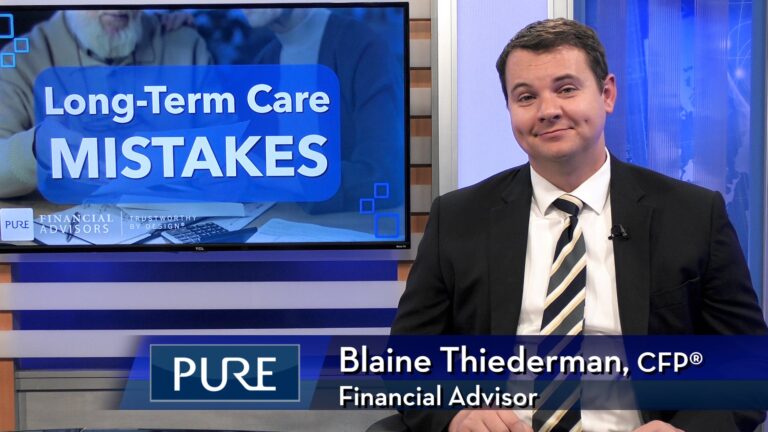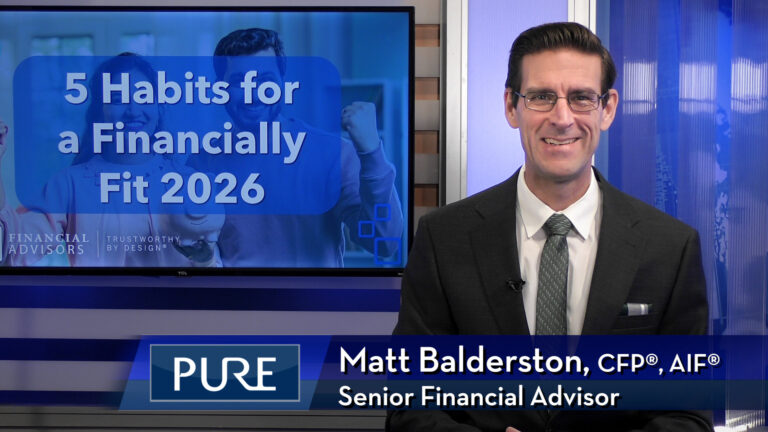Do news headlines have you worried about the long-term future of the US dollar? If so, Pure’s Executive Vice President & Chief Investment Officer Brian Perry, CFP®, CFA, AIF®, will help explain the vital role the US dollar plays in the global financial system and discuss how dominant its position is relative to other currencies. You’ll also learn about some potential dollar alternatives and why, despite the hype, no other currency is ready to take the dollar’s place as the global reserve currency.
FREE GUIDE | Beyond Borders: Global Investing
Transcript
I’m Brian Perry, the Executive Vice President, and Chief Investment Officer here at Pure Financial Advisors here today to talk to you about the debt ceiling and the dollar. We’ve been getting a lot of questions due to headlines around the United States potentially breaching the debt ceiling limit and possibly defaulting on its debt implications for the US dollar. So, I wanted to address some of those.
For starters, the United States is the world’s reserve currency, the dollar. That’s our status right now and there are pros and cons to that. A strong dollar, a pre-eminent currency like we have allows us to borrow money abroad more cheaply, that’s a positive. It also allows us to control political events internationally, to a degree, by imposing sanctions on other countries. A great example of that being Russia invades Ukraine, we apply sanctions to Russia to help lock them out of the international financial system. The downside, though, of a strong dollar is also there. It makes exports more expensive, it increases the trade deficit, and it costs jobs. Some economists have estimated that a strong dollar cost millions of jobs especially in manufacturing centers like the old Rust Belt. So, I think it’s important right out the gate to realize that if the dollar weakens whether in the short term cyclically or in the long term secularly that has positives as well as negatives for both the economy and investing.
The reason a lot of these topics are coming up more recently though is this. First of all, the debt ceiling and worries about that but second of all sanctions on Russia and the concern that other countries have about how they might be next. Right, if the US doesn’t like what China does or something China worries about us sanctioning them. So, there’s a growing impetus for other countries to try to trade internationally among themselves in different currencies. There are barriers to that though, in order to be a reserve currency, you need large liquid capital markets, a place to park your money, that’s the US treasury market, the biggest market in the world. You also need to be able to get your money back out, that’s known as being freely convertible. If you invest in something the US dollar, you park your reserves there, and when you need the money, you need to be able to take it back out. That’s not the case in a lot of countries including China.
Debt Ceiling
The other worry right now about the dollar is the debt ceiling and I’m not here to tell you what Congress is going to do or what the president is going to do because I don’t know, I don’t think anybody knows. But I will tell you that worries about the debt ceiling are nothing new, in fact, the debt ceiling has been raised 78 times since the 1960s. Sometimes it’s been automatic really easy other times it’s been contentious. In 2011, Standard and Poor’s actually lowered the credit rating on the US bonds because of concern that the US would breach the debt ceiling and default on their bonds. Importantly, even if we default and I’m not going to deny that a temporary default on US bonds would be very bad for capital markets would lead to volatility, but A, we don’t know if it’s going to happen, B, we don’t know when different dates are thrown around, and C is simply that it would only be a temporary default. The US is going to pay back its bills but if we’re in violation of the debt ceiling and we can’t get a new deal approved it’s possible that interest payments or other things would be delayed temporarily. It would probably be a great source of volatility for financial markets, it would be bad I don’t know that we’ll get there, but if we do it would be temporary. I think would harm the US standing globally, and harm our status as a reserve currency but I don’t think it would stop it. I still think the US dollar would be the reserve currency because there’s no other alternative. The US is so dominant internationally as far as our share of economic output as far as our share of global currency reserves and global currency trading that there’s really no other alternative at this point and I think there are some statistics here that really demonstrate that quite powerfully.
The US Dollar: Dominant Currency in the World
First of all, look at the percentage of global GDP and currency reserves. The US about 20-22% of global GDP or gross domestic product but about 60% of foreign exchange reserves. Who has of different levels of foreign exchange reserves again? The dollar, 62%. The euro is our next closest competitor at 20%, the yens about 6%, the pound sterlings at 4%. There’s a lot of talk of, hey is China going to come and be the global reserve currency? Are they going to take over for the dollar? It’s going to be a while they’re at 2% versus our 62% China’s got some catching up to do to replace the US as the world’s reserve currency.
What about percentage of allocated reserves? Again, you can see a different way of looking at it the US has been declining since the late 1990s but still again north of 60%. You see the euro, other currencies not really increasing a lot. The Chinese renminbi coming up here a little bit but still way, way behind even the Japanese yen or the euro let alone the US dollar.
Who has foreign exchange reserves? Well China has a lot of them but look at the countries behind there. Japan, Switzerland, Saudi Arabia, Taiwan, Russia, Hong Kong, India, South Korea, and so on. A lot of those countries are big US allies without necessarily a big impetus to move their reserves from the United States, whether for economic reasons, or geopolitical reasons.
And then look at this. This is global trade, this is the share of export invoicing, so look at this where the United States is almost 80% of global export invoicing that means that if you want to trade goods internationally in the Americas 90 something percent of all invoicing is done in the US dollar. In Asia Pacific, it’s more than 70%, Europe it’s a little bit lower because of the presence of the euro and then the rest of the world 80%. Most international trade being done in the dollar. Again, the dollar the dominant currency in the world. Could it fall? Could it go away? Could it not be the reserve currency? Sure, but it’s got a long, long way to go before that comes about.
And then let’s look at foreign currency debt issuance. Again, the blue is the US dollar. Dominant. Let’s look at foreign exchange transactions. Important to keep in mind that for a foreign exchange trade, you need to have two sides. When you trade a currency, you’re selling something and buying something, so if you’re selling the dollar, you’re buying something else, and vice versa. That’s why the numbers add up to 200%, you can see that more than 80% of all currency trades involve the dollar. What that means is 80% of all currency trades have the dollar on one side of it. The dollar for the pound, the dollar for the euro, the dollar for the yen. Again, the dollar being very, very dominant in global circles.
Potential Alternatives for the US Dollar
So, then it’s like OK what would have to happen for the dollar and no longer be the world’s reserve currency? The bottom line is you would need an alternative, so what could that be? Well, crypto people throw out could. Crypto could be the new reserve currency. Well, the role of a currency is to be a stable store of money and a medium of transaction. You can’t really spend crypto in a whole heck of a lot of places, and stable store of value, not opposed to crypto, but it’s pretty darn volatile. Up, down 50% again and again. How can you have a currency when you don’t know if it’s gonna be worth what X or X minus half tomorrow? So, I don’t think cryptos replacing the US dollar anytime soon as the global reserve currency.
What about the Chinese yuan? Well one of the basic principles of a reserve currency is a country puts their currency reserves in and then when they need them, they need to be able to take it out to support their economy. The yuans not freely convertible you can’t necessarily get your Chinese currency out when you want it, so I think that eliminates the Chinese yuan as a competitor in the short and even intermediate term.
What about the Brits, Brazil, Russia, India, China, South Africa? There’s talk about them issuing a joint currency right these big emerging market countries. I don’t know, do you want to invest your money in that? Maybe you want to consider before you do Brazil. You know why? Because Brazil has had eight different currencies since 1942, so this basket of currencies is just on whatever their newest most recent currency is, but they’ve had seven other ones going back the last 60 or 70 years. Do you really want to put all your money in something that may or may not be there tomorrow?
The euro, well in order to put reserves aside you need to buy something. The reason the US dollar among all the other benefits serves as the reserve currency is because of treasury bonds. Treasuries are the largest most liquid market in the world. The problem with the euro is that although it’s a big currency a big economic block there’s no central euro bonds. You can’t buy one European government bond; you have to go buy Italian bonds or German bonds or whatever. So that makes it really hard to park large levels of currencies there.
So, the bottom line is that although the dollar has issues, the US has issues, it’s all relative. What else are you going to buy if you’re a country around the world? Where else are you going to put your money? One of the challenges that the dollar has faced has been that countries have looked around and seen the sanctions put up against Russia and said alright well maybe we don’t want all our currency in the US, all our reserves in the US because we want some more protection against potential U.S. sanctions. But the bottom line is a lot of other countries have gone along with U.S. sanctions on Russia, including most of Europe, Japan, Australia, Canada, etc. Those countries are the vast majority of both global currency reserves, global economic output, global trade in a lot of cases 80% of currency reserves and trade are done by countries that are aligned with the United States in sanctioning Russia for its invasion of Ukraine. So, there’s not a big impetus to move reserves out of the United States by its allies.
The Bottom Line
The bottom line is this: the United States might eventually slow, it might see its proportion of the global economy decline, the US dollar might not even be the reserve currency at some point, but we have a long, long way to go and even if the dollar begins to gradually soften over time, it’s not a one-way street. There are positives significant positives to a weaker dollar along with some negatives both from an economic perspective also from an investment perspective. If the dollar weakens and you own international stocks as a U.S. citizen that’s actually a positive for your returns, so there are a lot of benefits to a weaker dollar as well as setbacks.
Finally consider this: for a long, long time, a century or more of the British pound was the global reserve currency. Then coming out of World War II, it was displaced by the dollar. I don’t know if you’ve been to England at all but they’re doing just fine. Yes, their share of global GDP has declined, the pound is no longer the reserve currency, but it doesn’t mean that the economy has collapsed, or the pound has gone away. So, there’s a big range of outcomes between a multilateral system where there are other currencies traded internationally in addition to the dollar and the dollar going away in the US collapsing. I think the former scenario where other currencies see greater market share whether that’s the Chinese yuan or anything else maybe crypto, trade it a little bit more, that could definitely come to pass. But a scenario where the US dollar goes away or is no longer the preeminent currency in the world I think as many, many years from now.
For more information on this or anything else visit us at purefinancial.com. Thanks for watching.
Subscribe to our YouTube channel.
IMPORTANT DISCLOSURES:
• Investment Advisory and Financial Planning Services are offered through Pure Financial Advisors, LLC, a Registered Investment Advisor.
• Pure Financial Advisors LLC does not offer tax or legal advice. Consult with your tax advisor or attorney regarding specific situations.
• Opinions expressed are subject to change without notice and are not intended as investment advice or to predict future performance.
• Investing involves risk including the potential loss of principal. No investment strategy can guarantee a profit or protect against loss in periods of declining values.
• All information is believed to be from reliable sources; however, we make no representation as to its completeness or accuracy.
• Intended for educational purposes only and are not intended as individualized advice or a guarantee that you will achieve a desired result. Before implementing any strategies discussed you should consult your tax and financial advisors.
CFP® – The CERTIFIED FINANCIAL PLANNER™ certification is by the Certified Financial Planner Board of Standards, Inc. To attain the right to use the CFP® designation, an individual must satisfactorily fulfill education, experience and ethics requirements as well as pass a comprehensive exam. Thirty hours of continuing education is required every two years to maintain the designation.
CFA® charter – Chartered Financial Analyst® designation contains three levels of curriculum which includes analysis using investment tools, valuation of assets, and synthesizing the concepts and analytical methods in a variety of applications for effective portfolio management and wealth planning. Candidates must meet enrollment requirements, self-attest to professional conduct, complete the approx. 900 hours of self-study, and successfully pass each level’s 6-hour exam to use the designation. CFA Institute does not endorse, promote, or warrant the accuracy or quality of Pure Financial Advisors. CFA® and Chartered Financial Analyst® are registered trademarks owned by CFA Institute.
AIF® – Accredited Investment Fiduciary designation is administered by the Center for Fiduciary Studies fi360. To receive the AIF Designation, an individual must meet prerequisite criteria, complete a training program, and pass a comprehensive examination. Six hours of continuing education is required annually to maintain the designation.












